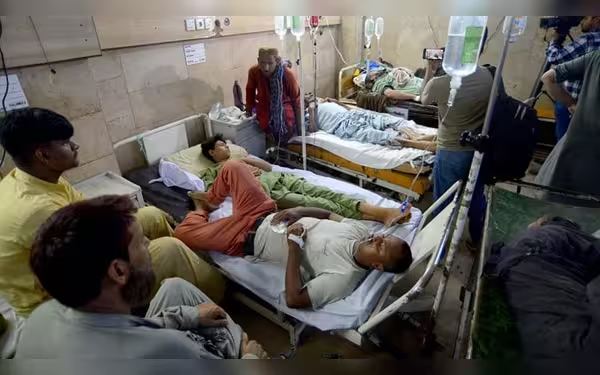Saturday, November 16, 2024 05:59 PM
Dengue and Malaria Surge in Karachi Amid Rising Viral Infections
- Karachi faces alarming rise in dengue and malaria cases.
- Hospitals report significant influx of patients with viral symptoms.
- Preventive measures are crucial to combat mosquito-borne diseases.
 Image Credits: thenews
Image Credits: thenewsKarachi is experiencing a surge in dengue, malaria, and chikungunya cases, prompting urgent public health measures.
KARACHI: The city of Karachi is currently grappling with a significant rise in vector-borne diseases, particularly dengue, malaria, and chikungunya. Hospitals across the port city are inundated with patients presenting symptoms such as cold, fever, and body aches. Medical facilities like the Jinnah Postgraduate Medical Center (JPMC) and Civil Hospital are reportedly seeing at least 50 new patients each day, highlighting the urgent need for public health interventions.
According to the Sindh Health Department, the situation is alarming. This year alone, there have been at least 411 suspected cases of chikungunya reported in the province, with 153 of those confirmed through medical diagnosis. The dengue situation is equally concerning, with 1,724 cases reported in Sindh, of which 1,484 were documented in Karachi. Tragically, there has also been one reported death due to dengue fever in the province.
Malaria cases are on the rise as well, with the health department noting that 222,239 cases have been reported in Sindh this year, including 1,768 diagnosed in Karachi. The increase in chikungunya cases has led to a surge of patients seeking medical attention, yet sources indicate that government hospitals are facing a shortage of chikungunya testing kits, complicating the situation further.
Dr. Bilal Aheed, a family physician at Agha Khan Hospital, explained the symptoms associated with these viral infections. He stated, "People experiencing high-grade fever, body aches, joint pain, and swelling or redness on the skin should be cautious. These symptoms are often linked to viral fevers such as dengue and chikungunya, which are spread by a type of mosquito called Aedes." Specifically, the Aedes aegypti and Aedes albopictus mosquitoes are the primary culprits in transmitting these diseases.
These mosquitoes thrive in urban environments, particularly in areas where stagnant water accumulates, such as open containers, puddles, or water tanks. To combat the spread of these diseases, Dr. Aheed recommends several preventive measures. Keeping the environment clean, eliminating standing water, and using mosquito repellents can significantly reduce the risk of infection.
As the situation continues to evolve, it is crucial for residents of Karachi to remain vigilant and proactive in protecting themselves and their families. Awareness and education about these diseases can play a vital role in prevention. By taking simple steps to reduce mosquito breeding sites and seeking medical attention at the first sign of symptoms, the community can work together to mitigate the impact of these viral infections. Staying informed and prepared is key to safeguarding public health in these challenging times.













